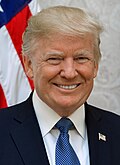For primaries in other races, see 2020 Vermont gubernatorial election and 2020 United States House of Representatives election in Vermont.
| |||||||||||||||||||
17 Republican National Convention delegates | |||||||||||||||||||
|---|---|---|---|---|---|---|---|---|---|---|---|---|---|---|---|---|---|---|---|
| |||||||||||||||||||
 County results Trump—90–95% Trump—85–90% Trump—80–85% | |||||||||||||||||||
The 2020 Vermont Republican presidential primary took place on March 3, 2020, as one of 14 contests scheduled for Super Tuesday in the Republican Party primaries for the 2020 presidential election.


